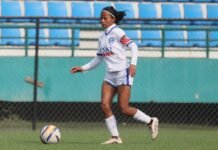Super fan Bhogtoram Mawroh isn’t all that hopeful for the chances of Shillong Lajong’s all-Indian I-League squad. He explains why…
Shillong Lajong’s decision to buy no foreigners for the season came as a surprise the first time I read about it.
I would have preferred if the news had been broken through local publications. If we want the game to develop in the state the local institutions that are connected to it must also be supported. This news could have been given to all publications, local, regional and national. My annoyance may seem rather trivial, but it is this small detail which is very important to help understand Lajong’s monumental decision: a decision which has the potential to backfire spectacularly.
With this decision Lajong have already made it clear that they are not going to challenge for the I-League trophy. This is a long way from the time when Lajong made the promise to its supporters that they aim to be one of the best teams in Asia. But it aligns very well with what Lajong had expressed during the Indian Super League’s initial years.
Larsing Ming Sawyan had stated that he was happy with Lajong not playing in the ISL but acting as a feeder club. In simple words, it means that Lajong will be an ISL-B team which will give opportunities to young players and then sell them to the highest bidder. This strategy worked well in the last auction with Lajong able to sell players for a combined amount Rs 1 crore.
So, in terms of business strategy this makes complete sense. The focus on economics rather than football was also evident in player recruitment.
For the last few years Lajong have not been buying domestic players, choosing to go with players who have started in their academy or who have been brought over from other academies when they were very young. In fact, most of the young players who played for Lajong were not players who began in their academy. Nonetheless this strategy is very cost effective. I don’t have any details on the contract of these young players, but it is going to be lower than what a seasoned Indian player would get.
And now they are not going to buy any foreign players as well. So, the whole strategy is about cost-cutting and trying to squeeze as much revenue as possible. But to make money you have to spend money and Lajong may have overplayed their hand in this. With this highly inexperienced team there is every chance that Lajong will struggle.
If one looks at past seasons, the years when Lajong did very well, they had good foreigners, especially strikers, like Cornell Glen and Aser Dipanda. Before them you had Minchol Son, who, for me, was the best foreign player to have played for Lajong. It was these players who helped Lajong survive in the I-League and reach respectable positions.
Apart from churning out match-winning performances, these players provided leadership and guidance to the younger players (to which I will come later) helping them to develop their game and grow as professionals. With the recent decision there is every chance Lajong will be dragged into a relegation dogfight (again). When that happens they will be forced to dip into the transfer window but it could be too late by then.
And if they get relegated who is going to buy their players? Winning promotion may not be very easy next time. They might get stuck in the lower division for years. In the process they are going to lose their years of investment.
So, in the end this business decision is actually not a very smart one and has every possibility to become akin to the bad loans to the corporate sector which resulted in huge non-performing assets in the banking sector and one of the reasons for demonetisation (though I think financial decimation of the opposition parties was the main reason).
What about the young players in Lajong? Is this not a good decision for them? I have always clamoured for giving local talent more opportunities. This decision, to be fair, will now allow young, local players the opportunity to play in a competitive league which is going to be invaluable for their development.
But opportunity is not enough for getting better, you need guidance as well. Because these players are inexperienced they will need leadership to help them navigate through periods of crisis and self-doubt. They will have bad days and in those times someone who has seen all and done all (experienced professionals) will make sure that their motivation does not waver.
The most experienced among the players is Samuel Lalmuanpuia, who himself is very young. Who will he look to when he has self-doubt? Can he turn to other players who are of similar age and pedigree and will they turn to him? I highly doubt that. The young players of Lajong need someone to help them tackle the challenges of being a professional footballer. The coaching staff may help but it is not going to be enough. This is because the young players of Lajong may have all the technical skills in the world but will still need to learn more on the actual pitch.
You may train all you want but the actual games are always different. In game situations emotions will run high and it is going to be very difficult, especially as the opposing teams will try to dominate them physically. In such situations, you need someone who is calm but at the same time vocal and aggressive to show the way. Senior professionals are the one who do that on the pitch. Young players in turn absorb that and incorporate it into their game. In time they then pass it on to their juniors. That link is now broken in Lajong and the players are going to be stuck learning on their own. And this is going to be a very painful process with many casualties.
Not every player is the same and everyone reacts differently to different situations. Some may be able to deal with these circumstances and come out of it stronger. But many will not. Lajong’s situation is not like the Indian Arrows project where results don’t matter. For a professional club like Lajong results are going to be very important. So, the youngsters are not only fighting for their careers but for the club’s survival as well. Such a heavy burden can be quite debilitating, even for senior players.
Imagine the pressure on the shoulders of these young players. When there is a bad run the pressure will increase and there will be those whose performance will suffer. Instead of realising that they need support and guidance the team management can wash their hands by saying that these stragglers do not have the mental strength to succeed.
If the young players express the desire for some experience they will be told that the experienced players will play in their positions. If you ask for help you are weak and if you don’t you are branded a failure. In trying times (Lajong have had a lot of them even with the senior players), what is needed is a presence in the dressing room who can keep the motivation high and who puts his hand on the shoulders of some who need extra coaxing.
The management can make the argument that as coach it is Alison Kharsyntiew’s responsibility to be that guiding figure. But is that a fair expectation? Alison is very new to this level and last year the coaching situation was a complete farce. Like the youngsters under him he also needs time to grow and become comfortable in the league. If the team do not do well he will be made the scapegoat for the decisions that were made by others.
With such a young team if Lajong does not get relegated it will be a big achievement. Those that remain unscathed can then be sold and replaced by others. This is the hope at least. In the process there will be casualties, particularly among the young players. But as long as the team somehow survives the management will be happy.
In the initial stages, Lajong tried to build a brand for themselves as the club for the entire region. Then came Aizawl and NEROCA and the pie became smaller. Now there is NorthEast United and the pie has become even smaller. Now this is an attempt to re-brand itself as a feeder club.
These are all business decisions but, like previous ones, they could backfire badly. Every club in the ISL and I-League are going to have their own youth players who they will prefer in the long run. What will Lajong do then? Nevertheless, I hope that this gamble pays off, not for the club but for the sake of these youngsters. I wish all the best to the team as they embark on another I-League season – the most challenging and the most difficult one yet.
(TSR file photo)














